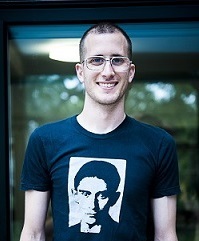Max Ritvo, a beloved member of the class of 2013, an English Department major and a member of the Writing Concentration, died on August 23rd, of cancer. Max was diagnosed with Ewing’s Sarcoma at sixteen; he came to Yale knowing that his time was limited, and he brought zest, passion, and exuberance to everything he did—his academic work, his life on campus, and his long and enduring friendships. At graduation he won the Yale College Everett Chandler Award for High Moral Purpose and JE’s John Chester Adams Cup for scholarship, character, and loyalty.
After graduation Max moved to New York, where he studied for an MFA at Columbia. He was on the editorial staff of Parnassus: Poetry in Review and was a member of the comedy troupe, His Majesty, The Baby, which he founded with fellow Yale students Shon Arieh-Lerer (ES ‘14), John Griswold (ED ‘14), Nathan Campbell (ES ‘14), and Andrew Kahn (MC ‘14). Max was compassionate and hilarious. A NPR podcast, “Who Are You Calling Inspiring” can be found at http://www.wnyc.org/story/who-are-you-calling-inspiring.
But most of all, Max was a brilliant and committed writer of extraordinary promise. Besides the many people he loved, what mattered most to him was poetry. His chapbook, Aeons, was chosen by the poet Jean Valentine and published by the Poetry Society of America, and his book of poems, Four Reincarnations, will be published by Milkweed Editions in October. Max wrote poems up to the time of his death: his death is not only a loss for those who loved him but to American literature. More poems can be found at http://maxritvo.com/ and an interview at http://www.divedapper.com/interview/max-ritvo/.
The Yale community extends its condolences to all who will miss Max, especially his family and his wife, Victoria Ritvo, whom he married last August. The time and place for a memorial gathering at Yale will be posted on the English Department events page.
Poems by Max Ritvo
LIVING IT UP
The bed is on fire, and are you laughing?
You leave the bed
and leave me without thought.
The springs want to embrace each other,
but they’re afraid if they break
their spiral, they will never
be able to hold anyone.
I wish you would let me know
how difficult it is to love me.
Then I would know you love me
beneath all that difficulty.
You are tending not only to me, you tell me,
but to your other child—the air,
and air puts his feet in my slippers,
and air scrubs his teeth on my brush,
and we must learn to share a bed,
we must learn to share a body,
The money is running out.
We will have to split one needle
this winter
SNOW ANGELS
We call it snow
when the parts of God
too small to bear, contest our bodies
for the possession of our smallest sensations.
The snow brings suffering to the only thing small enough
to have lived peaceably next to suffering.
AFTERNOON
When I was about to die
my body lit up
like when I leave my house
without my wallet.
What am I missing? I ask
patting my chest
pocket.
and I am missing everything living
that won’t come with me
into this sunny afternoon
—my body lights up for life
like all the wishes being granted in a fountain
at the same instant—
all the coins burning the fountain dry—
and I give my breath
to a small bird-shaped pipe.
In the distance, behind several voices
haggling, I hear a sound like heads
clicking together. Like a game of pool,
played with people by machines.
FOR CROW
We tended to a crow,
and now it’s fine.
It shakes its head, and eats crickets,
forgetful bird
which you put in a pouch to make sleep.
They said his eyes were blue because he was young.
Black blurs the eyes of crows as they grow old—
all motion
disruption in a lake of light.
I am a crow, and
I think you are mostly a pattern of motion,
and I am a leaf—and your hands fan under
and over me, and create a little space
in which the thing in my life that adds up
is my motion.
I think you can be traced
most easily by the echoes of your kinetics, my love.
Your lips, neck, arms,
these are not a harbor;
the you-around-you is the harbor.
In our bed, in the dark,
it is not sound, it is not outline,
but the motion of you
that brings to the surface of my body
all of the apparentness
of a settling glass of muddy water.
How I feel is then forgotten,
and instead I find myself
moving, joy, moving!
